I read a lot of books. I’ve always been that way, ever since I first learned to read and would lose myself in Maud Hart Lovelace’s Betsy/Tacy series of books (Heavens to Betsy was my favorite). Sometimes I want to read to lose myself in another world. This usually means a book of fiction. Sometimes I read because I want to find myself in the pages. This usually means a book of non-fiction, typically memoir. But I can find myself in fiction and lose myself in memoir. Both serve important functions in my life.
The books below are books where I found myself. Because motherhood can be an isolating experience, especially when we don’t feel comfortable sharing how difficult we find it at times, it can be validating to find some of your very hidden thoughts reflected back at you from the mind of someone else. I hope that if you are longing to feel seen in the pages of a book, these reads will remind you that you are far from alone.
NON-FICTION TITLES
My Wild and Sleepless Nights: A Mother’s Story: Clover Stroud
“Every time a woman tells the truth like this, it sets another woman free.” Elizabeth Gilbert
I’ve quoted Clover in several of my posts because she has a way of hitting the nail on the head in a very relatable, non-precious way. This is a memoir about Clover’s experience after the birth of her fifth child. It lays bare the true tasks of motherhood, its ups and downs, its joys and struggles, in an unvarnished, honest way. Reminiscent of Rachel Cusk’s A Life’s Work (see below), Stroud is able to give voice to the inanity of those early days with young children, how a mother can feel like she is losing her mind even on days that seem to require very little of her. But she also has older children and reflects on the different ways she is still deeply needed even as her children become more independent. She uses words and images that resonate with me deeply: tethered, consumed, imprisoned. And yet she is able to also beautifully name the joys of motherhood, the immensity of the love she has for her children, love that doesn’t take away from how hard being a mother is.
“Mothering itself was tethering me again… I hadn’t realized that the feeling of entrapment couldn’t be solved by fields, or space, but was a place I carried inside me.”
“Loving them is easy; it’s pure joy. But being a mother, and what that demands of me, night and day until I feel like I have become an eclipse, is something else.”
“My voice and blood pressure rise exponentially from 8 until 8:40, during which time the younger children will run around me in circle as I yank them into their clothes, coerce them into opening their mouths just for a moment so that a toothbrush might touch as least some of their teeth, persuade them to let me run a brush over the top of their tangles, remind them that cereal is for eating rather than spilling all over one another, and then shout at them to hurry up again and again and again so that we can at least have a vague chance of leaving the house on time, carrying book bags which almost certainly won’t contain the worksheets they were supposed to do the previous night. Worksheets along with permission slips and the endless stream of missives which come from the school – bring a jar of sweets for the raffle! Don’t forget the signed permission slip for the school photo! All children must come to school with a named water bottle, sun cream and sun hat every day! Come to astronaut training club to see what the children have been up to this week! – can almost all be guaranteed to self-combust as soon as they get into the kitchen, itself a Bermuda Triangle of missing library books, school shoes, reading journals and parking fines.”
“Neither do I know how to articulate the joy and claustrophobia of this, or the fact that while someone has been with me the entire time, touching me, prodding me, pulling at me, I have felt acutely lonely…. He’d think I’d gone mad if I described how intense my longing was for this moment in my life to be over, while also feeling cauterized by a quiet sort of grief.”
A Life’s Work: On Becoming a Mother: Rachel Cusk
This memoir from an acclaimed novelist was written back in 2001. Like Clover Stroud, Cusk is British (is there something about their culture that allows more displeasure around the act of mothering?) This book is a poignant reflection on the claustrophobia of mothering an infant. I loved Cusk’s reflections about how much of her previous identity was erased by the needs of her infant and her subsequent desire to escape the demanding nature of her care just so she can have access to that previous self now and then. Cusk is brave enough to admit her maternal ambivalence, her mixed feelings about this job.
“Motherhood, for me, was a sort of compound fenced off from the rest of the world. I was forever plotting my escape from it.”
“Birth is not merely that which divides women from men; it also divides women from themselves, so that a woman’s understanding of what it is to exist is profoundly changed. Another person has existed in her, and after their birth they live within the jurisdiction of her consciousness. When she is with them, she is not herself; when she is without them, she is not herself, and so it is as difficult to leave your children as it is to stay with them. To discover this is to feel that your life has become irretrievably mired in conflict, or caught in some mythic snare in which you will perpetually, vainly struggle.”
“To be a mother I must leave the telephone unanswered, work undone, arrangements unmet. To be myself I must let the baby cry, must forestall her hunger or leave her for evenings out, must forget her in order to think about other things. To succeed in being one means to fail at being the other.”
“…this, I suddenly and certainly know, is motherhood; this mere sufficiency, this presence…All that is required is for me to be there; an ‘all’ that is of course everything, because being there involves not being anywhere else, being ready to drop everything.”
“My daughter quickly comes to replace me as the primary object of my care. I become an undone task, a phone call I can’t seem to make, a bill I don’t get around to paying. My life has the seething atmosphere of an untended garden.”
“…it was in her nature, so I read in books, to attach herself, as if I was a wall and she was the vine growing up it. What I wanted was to train her on to something else so that she could stay standing for periods while I briefly absented myself.”
And Now We Have Everything: On Motherhood Before I Was Ready: Meaghan O’Connell
Don’t be fooled by the subtitle. The truth is, none of us is ever ready for the self-erasing experience of motherhood. This honest memoir not only reflects on how unprepared we are for the bomb that is having a baby, it also explores the reality of new motherhood juxtaposed with the rose-colored glasses we are handed by our society. O’Connell’s account of her childbirth experience being vastly different than she intended is essential reading. The chapter on sex after childbirth is the most honest account of what that experience can be like, and the isolating feeling you can get from your own body.
“You know you’re supposed to talk to them but it feels insane. And you just, like boop them with toys on the nose, like they’re dogs…boop. I feel a wave of longing when I say this stupid word: boop. It was part of my baby language, always would be. I remember his laughter, his stillness, staring back up at me, how his eyes would flash at me a certain way and I’d be convinced we were communicating on some deeper plane, beyond words, and I want to take back all my wild urges to be elsewhere. Wasn’t this life at its most elemental? Wasn’t this what I was working toward with writing?
If only I had the sort of spiritual stamina to stay in profundity longer, to not find it oppressive after ten minutes.”
Like a Mother: A Feminist Journey through the Science and Culture of Pregnancy: Angeles Garbes
I recommend this book to any person considering becoming pregnant. Not only does Garbes examine pregnancy in a nuanced and scientific way, she also gives our bodies the credit they deserve for doing the amazing work of creating a human. She, like O’Connell, doesn’t have the childbirth she was hoping for (who of us does?), and thus for that chapter alone, it is worth reading to unpack how there is no one right way to give birth. Garbes has a new book coming out in May called Essential Labor and I plan to read it as soon as it is available. She is unpacking motherhood in a way that is creative, new, and yes, essential.
“Many of us experience dark moments and difficult periods, but not all of us have a support network and path out. It isn’t anyone’s fault if they don’t. It’s not hard to see how the obliteration of the self, without any support or acknowledgement of this shift, could break someone. Or how the need to survive could cause a mother to detach from her emotions.”
“Nearly a year after our daughter was born, my husband and I went out to dinner to celebrate our anniversary. As we sat there, martini glasses between our fingers, he asked me how I was feeling. “Honestly,” I told him, “that feels like an irrelevant question. I’m just doing stuff.”
I was stunned to find that, as someone who spent more of her twenties writing down the subtle contours of every feeling in a journal and crying, I was now saying that feelings were irrelevant, an impediment to getting through each day. But it was true. It was far easier and far more useful to talk about the things that needed to get done – grocery shopping, bill paying, taking out the garbage, feeding our daughter, getting her down for a nap – than the emotions I experienced while doing them.
I had been exposed for the beast I truly was; my primary concern was enduring. It was only after about eighteen months that the richness of life – a less debilitating sense of tiredness, being able to notice the changing of the seasons – began to creep back in. Around the same time, our daughter started to be able to show us real affection. I feel like I just came up for air, I told a friend. I didn’t realize I had been drowning. I began to feel like myself – or at least a more familiar version of myself – again. My husband and I started to catch glimpses of what it was like to be us, to spend time together, before we were parents.”
Women’s Work: A Personal Reckoning with Labor, Motherhood, and Privilege: Megan K. Stack
Megan K. Stack is a National Book Award finalist and journalist whose work assigned her to live in places like China and India, where household labor is much more affordable than in the United States. She planned to finish writing her second book after having a baby, what she thought would be a perfect chance to hunker down, away from other deadlines and responsibilities. Of course, it didn’t go that way. In this book, a New York Times Notable book for 2019, she combines memoir and her skills as an investigative journalist to examine the concept that, if we are not going to be the ones doing the household and caregiving work, it inevitably falls to the hands of other women, usually women of color. “The most brilliant and socially conscious female professionals I met around the world – the human rights workers, entrepreneurs, artists, journalists, diplomats, and wonks – enabled their careers by hiring impoverished women to care for their children. That was the underbelly. That was the trade-off. There was no other solution in sight.”
“The cold reality of my gender was dawning on me. I’d known enough, already, about harassment and domestic violence and pay differentials and the incessant, exhausting focus on how you look and laugh and talk. But it had all been basically manageable – not ideal certainly, even enraging, but navigable – right up until the baby came.
It was motherhood that forced me to understand the timeless horror of our position. The obvious, hidden in plain-sight reason women had not written novels or commanded armies or banked or doctored or explored or painted at the same rate as men.
The cause was not, as I had been led to believe, that women had been prevented from working. Quite the opposite: we had been doing all the work, around the clock, for centuries.
Somebody, after all, must wash and feed and train the kids and get the food and clean the house and care for the sick and elderly. That work is physically depleting, logistically daunting, and relentless. It is not a job, but a constant gaping demand for labor. It's a ceaseless work that has gobbled up our energy and stamina, eroded our collective health, and starved our communal mind of oxygen for generations.
We did the work, taught our daughters to do the work (assuming we survived their birth), and then we died. That was it. Domestic toil had ground us, one after the next to dust. We had not been educated because then, naturally, we might balk at the work. We might have the audacity to point out that we were doing all the work. We might ask the men to do some of the work, themselves. And they didn’t want to do the work. Nobody wants to do the work, if they can escape it.
Still we go around thinking that our primary problem, the essence of our position, is that men explain things to us or that we make less money for the same job.
But most basically, it’s the work – the work that we still, somehow have not managed to escape. It’s the work we pretend doesn’t exist.”
“As for me, I fought because I was reeling in shock, and because Tom was hardly there at all. He had slipped easily back into his old life while I had been bombed back to some prehistoric version of myself. And I was angry that he had accepted this superior position, this lesser interruption, as a sort of birthright. And so I fought with his absence.”
“My time had been used as capital. It had been invested in the family future to improve our collective position. Well fair enough. That’s the sort of thing we do in families. I paid slices of time: maybe I paid brain cells, or a book or two. I paid and its gone. My babies are beautiful, my heart is whole, I’m not asking for a refund.
Still it does not escape my attention that I paid in time. There is a lingering expectation that men will pay in money. But when it comes to time, it is almost always the woman who pays. And money is one thing, but time is life, and life is more.
How many ideas, how many discoveries, how much art lost because the woman spent her time somewhere else? How many ideas stillborn, how many inventions undone, how much original thought passed off quietly to a man so he can take credit – just not to waste, not to miscarry the idea, to pass it, one way or the other, into the world?
I did it, too. I paid my time.”
FICTION
Nightbitch: A Novel: Rachel Yoder
This book made me feel like the anger that simmered beneath the surface for so many years of my motherhood was not mine to carry alone. It follows a mother of a toddler who has given up her work as an artist to raise her son. Her husband travels for work so it is frequently just the narrator and her son and the constant repetition of their days. She starts to lose her mind a bit, without any adults to talk to, with so many portions of her brain lost in hibernation. She longs for her art, her creator self, the chance to do more than mothering.
To read someone else report the very same thoughts you’ve had, maybe not consciously, but unconsciously in the depths of your soul, to see them laid bare on the page, was disorientating, as if I was reading myself. If you are still in the weeds of early motherhood, you may think you don’t want to read a reflection of a life so much like yours. I don’t need to read the desperation, I’m living it every day. Or maybe you will feel seen in a way you never have before. Maybe you will finally recognize that you are not alone in the discomfort of motherhood, in your aching ambition that won’t recede. Please note that the three quotes below come in the first thirty pages of the book. Trust me, you will be highlighting all the way through.
“Why was she so ungrateful?....at the time, when decisions had to be made, she had truly wanted to stay home – she was, in a word, exhausted – though she had never wanted such a thing before. And honestly, what a privilege. What a treat...she was living the dream of holding her baby twenty-four hours a day. According to basically everyone’s standards, she had nothing to complain about.”
“That night, as she waited in bed beside the boy, her husband lounged in a hotel room somewhere, reading a book or watching TV or playing video games, eating from a room-service tray laid out on the bed. Even if he was working on spreadsheets or filling out service reports on his laptop, the image of him there, by himself, in a quiet space, seemed luxurious and exotic. In her darkest moments, she imagined that her husband craved this time away from them, a wave of relief washing over him each Monday as he pulled out of the drive. Four whole uninterrupted nights of sleep! Blackout curtains! A discrete, achievable task to accomplish that day! A paycheck to expect at the end of the week!”
“She inhaled deeply, intoxicated, before steeling herself against the tears she felt welling from a place of profound and desperate longing to return to her projects – any project – and the complete inability to do such a thing.”
Motherhood: Sheila Heti
I listened to a fascinating podcast discussion between three wonderful writers, Sheila Heti, Rachel Zuker and Sarah Manguso in which Sheila read a quote from this work. The quote literally brought me to tears as I hiked the Dish, a trail near my house in Palo Alto. I immediately went to my closest independent book store and ordered it. At the time, I assumed she was writing non-fiction. It turns out, this is a novel. But the character in question likely has much in common with Heti. In the book, a writer is trying to decide whether to become a mother. She is on the receiving end of all the typical pressures of placed on her by society. But she knows that to choose the path of motherhood would mean to abandon in some way her first child, which is her writing. Her partner already has a child from a previous relationship and does not want any more. She puts into words the intense pressure women feel to procreate, to do their job, which is still, in many people’s minds, to create other humans, to give themselves over to this work. The way she depicts this societal pressure and the many ways it seeps into our consciousness, is astonishing.
“It suddenly seemed like a huge conspiracy to keep women in their thirties - when you finally have some brains and some skills and experience - from doing anything useful with them at all.”
“It seemed to me like all my worrying about not being a mother came down to this history - this implication that a woman is not an end in herself. She is a means to a man, who will grow up to be an end to himself, and do something in the world. While a woman is a passageway through which a man might come….If you refuse to be a passageway, there is something wrong. You must at least try. But I don’t want to be a passageway through which a man might come, then manifest himself in the world however he likes, without anyone doubting his right.”
“He said that one can either be a great artist and a mediocre parent, or the reverse, but not great at both, because both art and parenthood take all of one’s time and attention…As for the vow of chastity demanded by the church, he thought ultimate it had to do with the fact that those given over to difficult spiritual work should not have to be chasing children around.”
“The most womanly problem is not giving oneself enough space or time, or not being allowed it. We squeeze ourselves into the moments we allow, or the moments that have been allowed us. We do not stretch out in time, languidly, but allot ourselves the smallest parcels of time in which to exist, miserly. We let everyone crowd us. We are miserly with our selves when it comes to space and time. But doesn’t having children lead to the most miserly allotment of space and time? Having a child solves the impulse to give oneself nothing. It makes that impulse into a virtue. To feed oneself last in self-abnegation, to fit oneself into the smallest spaces in the hopes of being loved - that is entirely womanly. To be virtuously miserly towards oneself in exchange for being loved - having children gets you there fast.
I want to take up as much space as I can in time, stretch out and stroll with nowhere to go, and give myself the largest parcels of time in which to do nothing - to let my obligation slip to the ground, reply to no one, please no one, leave everyone hanging, impolitely, and try to win no one’s favor; not pile up politenesses doled out to just everyone in the hopes of being pleasing, so I won’t be thrown out of society as I fear I will be, if I don’t live like a good maid, gingerly.”
“The woman who doesn’t have a child is looked at with the same aversion and reproach as a grown man who doesn’t have a job. Like she has something to apologize for. Like she’s not entitled to pride.”
The School for Good Mothers: A Novel: Jessamine Chan
I will share my thoughts about this remarkable book more deeply in my review of it for Literary Mama in our May/June issue, but I couldn’t not include this book on this list. The School for Good Mothers is a heartbreaking book about a mother who makes a mistake and loses custody of her daughter. She then must go to a school to learn how to be a good mother. It puts into stark relief the impossible standards of modern motherhood.
“I find your negativity very troubling, Frida. There is no can’t…take can’t out of your vocabulary. A good mother can do anything.”
“The instructors tell them to manage their frustration by staying calm. They’re showing their children that a mother can handle anything. A mother is always patient. A mother is always kind. A mother is always giving. A mother never falls apart. A mother is the buffer between her child and the cruel world. Absorb it, the instructors say. Take it. Take it.”
Fleishman Is in Trouble: Taffy Brodesser-Akner
I featured this book in my post on maternal finitude, so I won’t go into too much detail here except to stay that last two sections of this book are quietly revolutionary. A few quotes below prove my point.
“Right before you were pregnant, you were a person. The minute you became an incubator for another life, you got reduced to your parts.”
“She thought of how every mother she knew seemed neutered to her, like they were not serious people. How had she not realized that she was joining a club she could barely tolerate?”
“Toby went back to work six weeks after Hannah was born, but Rachel didn’t. At six weeks, she’d wait for Mona to take Hannah on her walk and then would go into the living room, where at eleven A.M. a ray of sunlight streamed through the window, and she would sit in the warm spot, first on her knees, and then she would bend over like a Muslim in prayer and stay there and cry. How could it be, she wondered. How could it be that the simple act of having a child did this to you? Had every birth in the world ruined every woman in the world? Was this a secret they’d been keeping, or had she just not been listening? Underneath all the vacuous, cruel wisdom the women who saw her in her late stages of pregnancy imparted to her, most of which had to do with banking sleep or measuring every precious moment because it all goes so fast, were they really telling her to mark her personhood?”
“God, I wanted to say, how are you supposed to live like this, knowing you used to answer to no one? How is this the arc we set for ourselves as a successful life? But he’d never understand that. He had the life he wanted. So did I. And yet. And yet and yet and yet and yet and yet.”
I, like Glennon, wish I had all the time in the world to read all the books. I know this is not an exhaustive list. What about the poetry? What about Maggie Nelson’s The Argonauts and Jenny Offill’s Dept. of Speculation? What about all the books to help you navigate your marriage post children i.e. Fair Play and Drop the Ball and All the Rage and How Not to Hate Your Husband After Kids? I know I know, I could write this post for years and probably not encompass all the books that deserve to be included. This is what I can put forth right now. Below are a few books that are on my TBR pile. Have you read them? What else would you add to this list?
TBR:
Inferno: A Memoir of Motherhood and Madness, Catherine Cho
Knocked Down: A High Risk Memoir, Aileen Weintraub
The Upstairs House, Julia Fine
I Love You But I’ve Chosen Darkness, Claire Vaye Watkins
This Boy We Made: A Memoir of Motherhood, Genetics, and Facing the Unknown, Taylor Harris

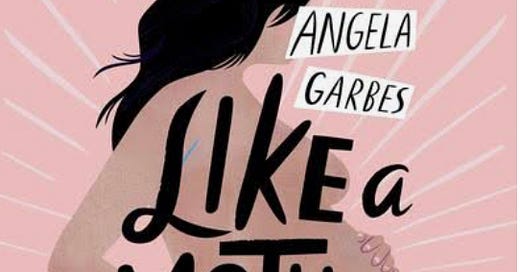


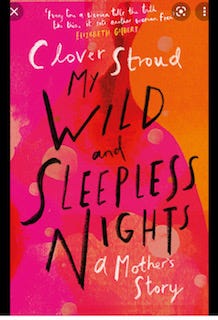

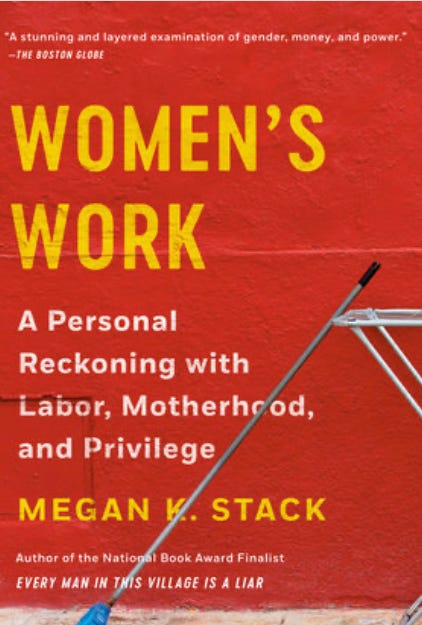
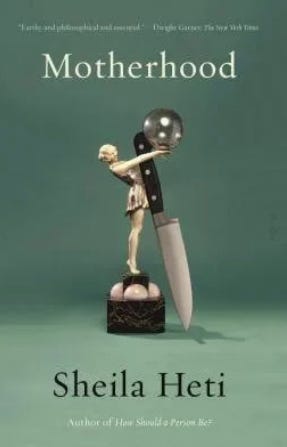
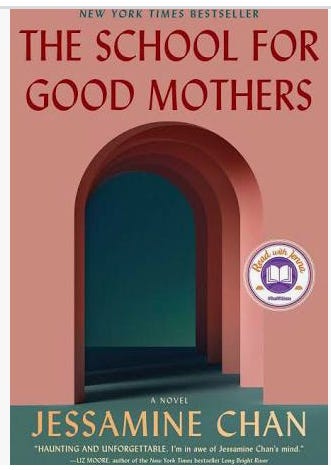

What would a just and parent-friendly/supporting society look like? Does one exist? One with common ground problem-solving, systemic re-visioning? Denmark, Sweden Iceland, Finland come galaxies closer than America, even though not perfect. Vote for living wages, non-stigmatized abortion access and paid parental leave!
Thx for this great list with so many wonderful quotes! The exerpts alone are a worthwhile read.